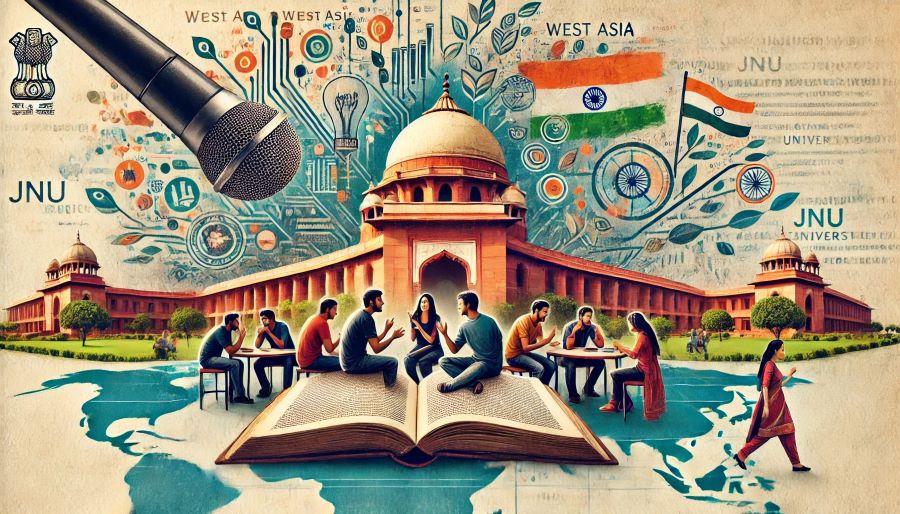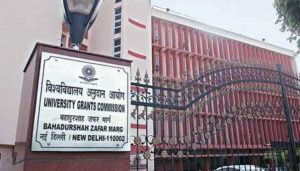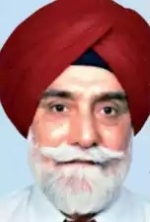Debate Intensifies Over Centralization, Autonomy, and Political Influence in Higher Education
The University Grants Commission (UGC) in India has introduced new guidelines for the appointment of Vice-Chancellors (VCs), claiming to ensure a more transparent, accountable, and merit-based process. These guidelines aim to address challenges in higher education governance and management.

While the UGC’s new guidelines seek to professionalize and standardize the appointment process of Vice-Chancellors, their successful implementation faces significant challenges. Ensuring meritocracy, reducing political interference, and preserving the autonomy of academic institutions will be key to making these reforms effective in the long term.
The guidelines place significant control in the hands of central bodies like the UGC and state governments. Some universities argue that this limits their autonomy, particularly in selecting VCs who understand the unique culture and challenges of their institutions.
 Despite attempts to make the process more merit-based, political influence often plays a significant role in VC appointments, especially in state universities. Ensuring that political pressures do not affect the selection process remains a challenge.
Despite attempts to make the process more merit-based, political influence often plays a significant role in VC appointments, especially in state universities. Ensuring that political pressures do not affect the selection process remains a challenge.
M. M. Ansari, former UGC member, and Dr. Ranjit Singh Ghuman, Professor of Eminence at Guru Nanak Dev University, Amritsar, have shared their views on the ongoing debate surrounding the appointment of Vice-Chancellors.
According to M. M. Ansari:
The proposed UGC guidelines for the appointment of university VCs give sweeping powers to Central Government-nominated Governors to select VCs for state universities. As the education sector is categorized under the Concurrent List of the Indian Constitution, the new guidelines are unacceptable since they undermine federalism and disrupt Centre-state relations in education. Both the Centre and states are constitutionally empowered to participate in the promotion of education and training at all levels.

M. M. Ansari
Why is the Central Government so keen to appoint its own heads for universities, particularly in states ruled by opposition parties? First, a VC is vested with extensive administrative and financial authority, including the recruitment of academic and non-academic staff at all levels. VCs approve schemes for university activities and services provided by private entities. Through its appointed VCs, the Central Government could gain complete control over university policies on admissions, recruitments, and contracts with preferred private vendors.
Second, university campuses in India are highly politicized, with teachers, non-teaching staff, and students often affiliated with various political parties. India’s federal setup and democratic polity allow them to participate in elections at local, state, and central levels. University and college campuses in India, the second largest in the world, host a significant number of voters—approximately 35 crore—who participate in three-tier elections. The ruling Central Government, the largest political party in India and globally, aims to control these campuses for political gains and to propagate its ideological agenda.
 Third, while the UGC is mandated to provide adequate funding for higher education institutions to promote quality education, research, and innovation, it has failed to fulfill this mandate. Instead, it has diverted attention to non-issues, such as the appointment of VCs in opposition-ruled states. The increasing commercialization of education continues to adversely affect access for lower-income groups—a concern the UGC has failed to address effectively.
Third, while the UGC is mandated to provide adequate funding for higher education institutions to promote quality education, research, and innovation, it has failed to fulfill this mandate. Instead, it has diverted attention to non-issues, such as the appointment of VCs in opposition-ruled states. The increasing commercialization of education continues to adversely affect access for lower-income groups—a concern the UGC has failed to address effectively.
Under the New Education Policy 2020, higher education and research have been relegated to lower priority. Most central and state universities face severe funding shortages, affecting faculty recruitment, program diversification, and quality improvement. Consequently, 30–50% of faculty positions remain vacant in universities.
 Without raising the standards of education and research to levels achieved by competing nations in the globalized market, India’s quest for prominence among the comity of nations appears challenging.
Without raising the standards of education and research to levels achieved by competing nations in the globalized market, India’s quest for prominence among the comity of nations appears challenging.
Unfortunately, many recent VC appointments have prioritized ideological alignment with the ruling dispensation over academic credentials or achievements. Such practices undermine academic freedom, university autonomy, and institutional accountability.
Professor Ghuman’s Perspective:
According to the new rules, a distinguished individual with high academic qualifications and at least ten years of experience as (i) a professor in a Higher Education Institution (HEI), (ii) a senior leader in reputable research or academic administrative organizations, or (iii) a senior professional in industry, public administration, public policy, or public sector undertakings, with a proven track record of significant academic or scholarly contributions, is eligible to become a VC.

Dr. R. S. Ghuman
The selection committee constituted by the Chancellor (Governor, in the case of state universities) shall submit a panel of 3–5 candidates, from which the Chancellor will appoint the VC. Under existing rules, the State Government constitutes the selection-cum-screening committee and submits a panel of three shortlisted candidates, allowing the Chancellor to appoint the VC. Under the new rules, however, the power of appointment shifts entirely to the Governor, a nominee of the Union Government.
Though the UGC Act, 1956, empowers the UGC to outline the procedure for appointing VCs, the new guidelines could have several adverse implications:
(i) Undermining the federal structure, state autonomy in education, and Centre-state relations.
(ii) Restricting the academic and administrative autonomy of HEIs, thereby impacting knowledge creation.
(iii) Ignoring socio-cultural and politico-economic diversity and regional aspirations.
(iv) Increasing bureaucratization and privatization of public HEIs.
(v) Limiting academic fraternity’s career growth to top academic and administrative positions, such as VC.
Above all, academic freedom for the fraternity would be further constrained. ![]()
_______
Also Read:
Indian Education System Needs Remodelling
Disclaimer : PunjabTodayNews.com and other platforms of the Punjab Today group strive to include views and opinions from across the entire spectrum, but by no means do we agree with everything we publish. Our efforts and editorial choices consistently underscore our authors’ right to the freedom of speech. However, it should be clear to all readers that individual authors are responsible for the information, ideas or opinions in their articles, and very often, these do not reflect the views of PunjabTodayNews.com or other platforms of the group. Punjab Today does not assume any responsibility or liability for the views of authors whose work appears here.
Punjab Today believes in serious, engaging, narrative journalism at a time when mainstream media houses seem to have given up on long-form writing and news television has blurred or altogether erased the lines between news and slapstick entertainment. We at Punjab Today believe that readers such as yourself appreciate cerebral journalism, and would like you to hold us against the best international industry standards. Brickbats are welcome even more than bouquets, though an occasional pat on the back is always encouraging. Good journalism can be a lifeline in these uncertain times worldwide. You can support us in myriad ways. To begin with, by spreading word about us and forwarding this reportage. Stay engaged.
— Team PT

